
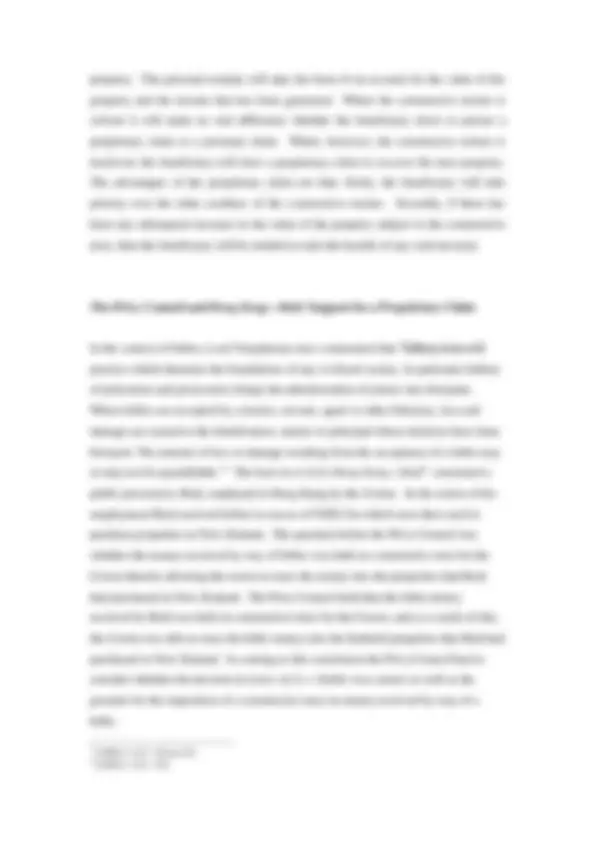
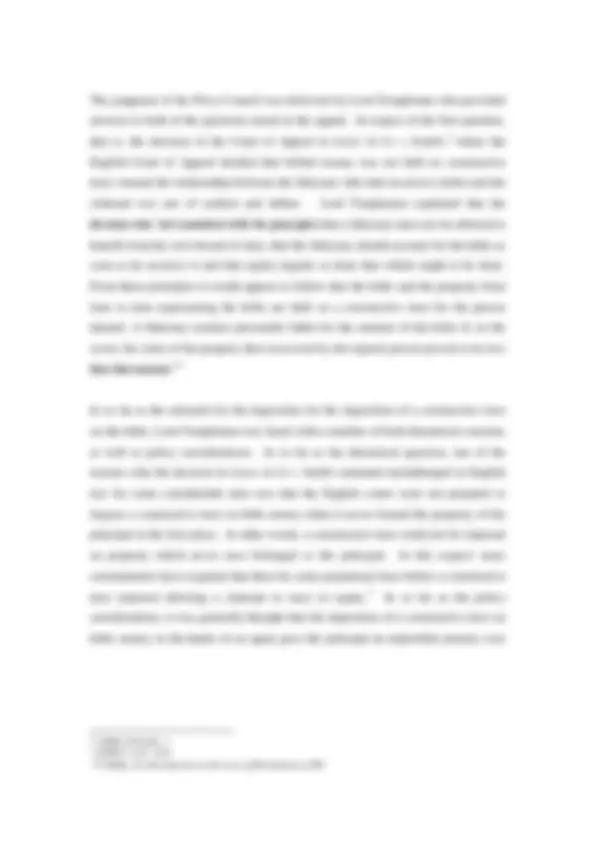
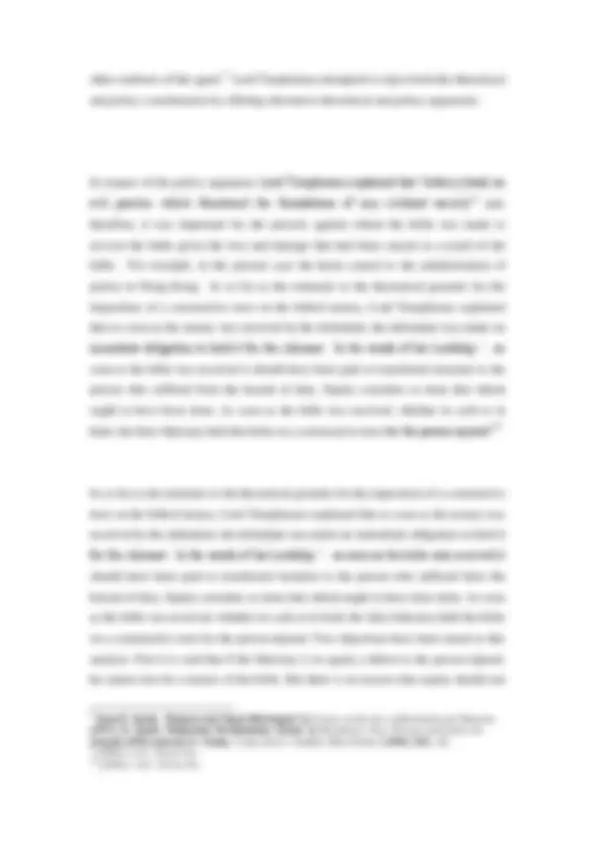
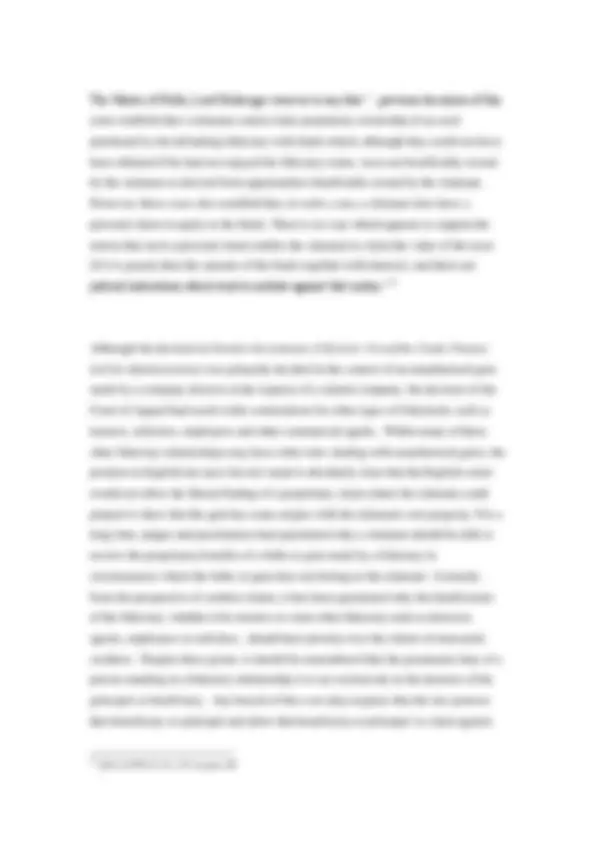
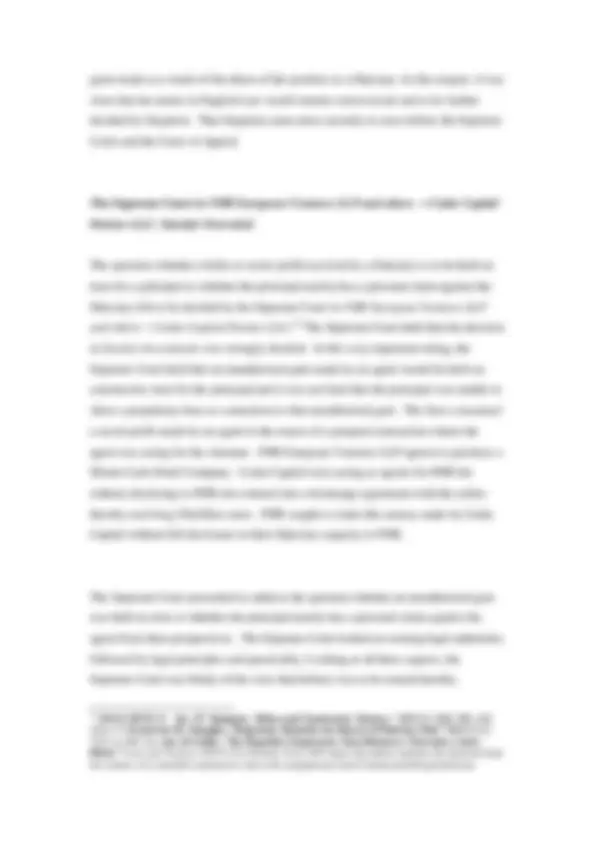
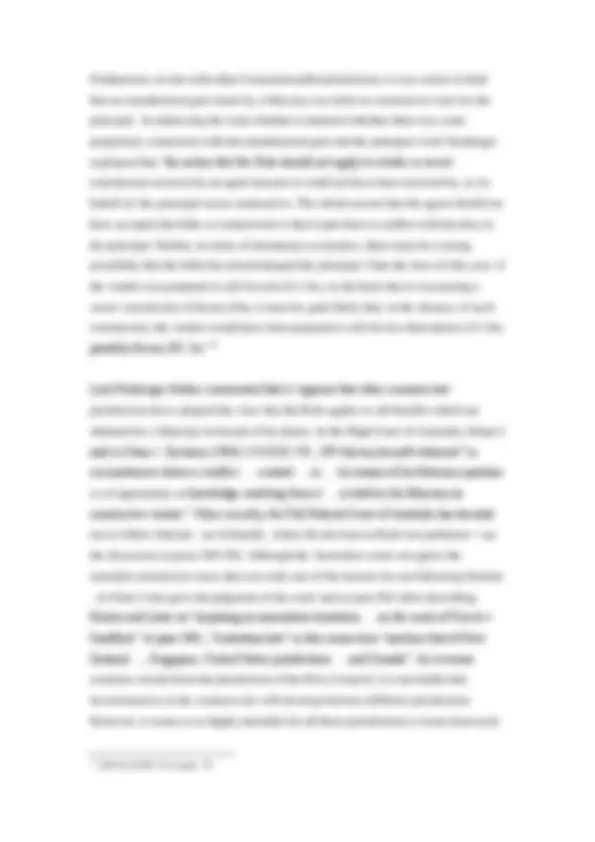
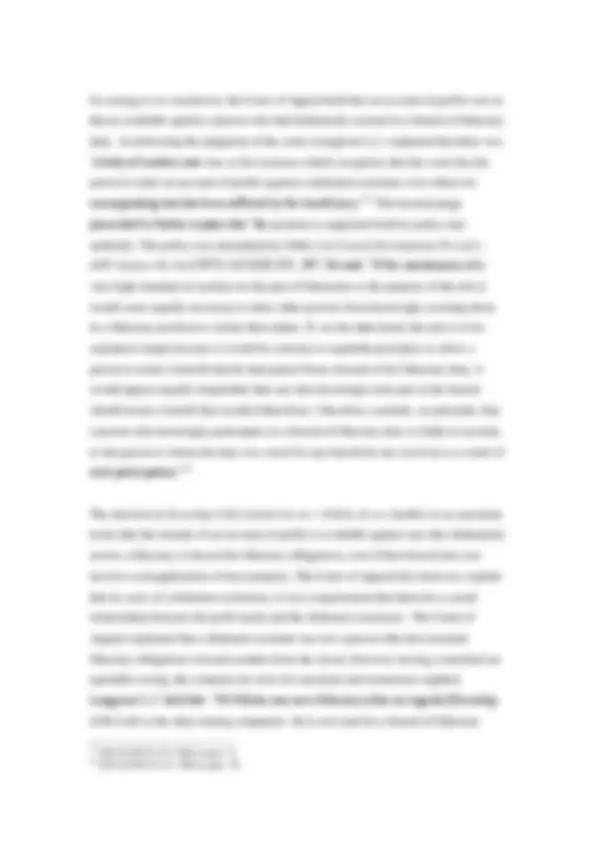
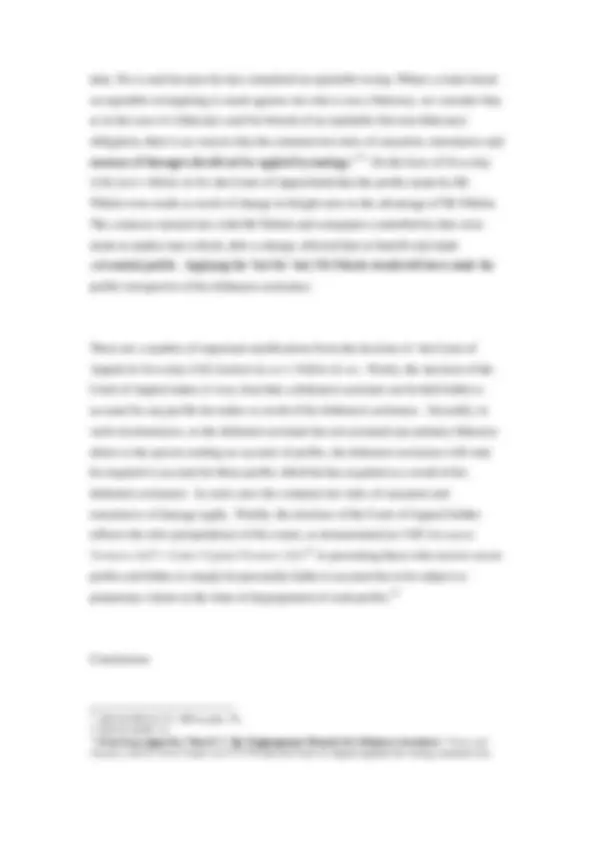
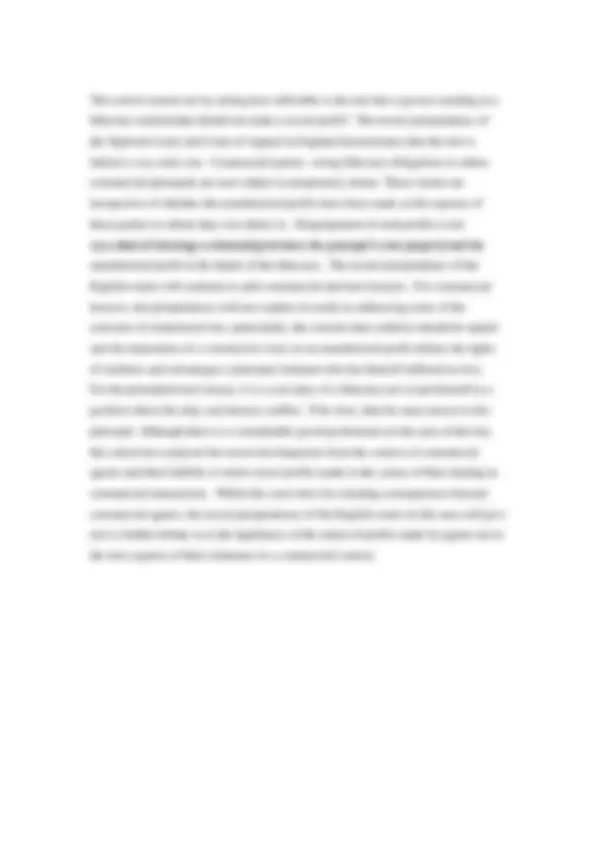


Study with the several resources on Docsity

Earn points by helping other students or get them with a premium plan


Prepare for your exams
Study with the several resources on Docsity

Earn points to download
Earn points by helping other students or get them with a premium plan
Community
Ask the community for help and clear up your study doubts
Discover the best universities in your country according to Docsity users
Free resources
Download our free guides on studying techniques, anxiety management strategies, and thesis advice from Docsity tutors
This article explores the legal concept of constructive trusts and their application to the recovery of unauthorized gains made by fiduciaries. various cases, including those involving bribes and secret profits, and the implications for commercial parties and their lawyers. It also touches upon the availability of an account of profits for those who dishonestly assist in a breach of fiduciary duty.
Typology: Lecture notes
1 / 15

This page cannot be seen from the preview
Don't miss anything!










Breach of Fiduciary Duty, Equitable Wrongs and Proprietary Remedies: Implications for Commercial Agents.
Sukhninder Panesar Head of Law School University of Wolverhampton
Introduction
Lord Herschell once wrote that ‘it is an inflexible rule of a Court of Equity that a person in a fiduciary position…is not, unless otherwise expressly provided, entitled to make a profit; he is not allowed to put himself in a position where his interest and duty conflict. It does not appear to me that this rule is, as has been said, founded upon principles of morality. I regard it rather as based on the consideration that, human nature being what it is, there is danger, in such circumstances, of the person holding a fiduciary position being swayed by interest rather than by duty, and thus prejudicing those whom he was bound to protect.’^1 The purpose of this article is to explore exactly how inflexible this rule is in the context of commercial parties who stand in a fiduciary relationship to others. In particular two areas are examined, firstly; commercial fiduciaries who have received a secret bribe or some other profit in the course of their employment. Secondly; commercial parties who, although not having assumed fiduciary duties to a particular commercial principal, have nevertheless assisted in a breach of fiduciary duty by some other person and in doing so have made a profit. In both cases, can the person against who the breach had been committed claim a proprietary right to the profits in the hands of the wrongful fiduciary? Furthermore, and more importantly in the context of this article, how far does it matter that the profit made by the fiduciary has been made in circumstances where
(^1) [1896] AC 44 at 51.
there has been no actual misuse of the principal’s own property. Put in another way, it is possible to disgorge profits not made at the expense of the claimant in the strict sense? This article will be particularly relevant to commercial lawyers advising their clients who may well have acted as agents in a commercial transaction and received incidental profits which, have neither been disclosed to other parties in the same transaction, and neither been made at the expense of the claimant now seeking a claim to such profits.
Profits and Proprietary Claims.
A proprietary claim to unauthorised gains or profits made by a fiduciary is usually made by the imposition of a constructive trust on the profit or unauthorised gain. The imposition of a constructive trust will confer upon a beneficiary of the constructive trust both proprietary and personal claims. A proprietary claim will arise because some property has been subjected to the trust. The beneficiary will be entitled to the property and any interest which is earned on it. For example, if a person standing in a fiduciary relationship breaches his fiduciary duty and acquires some property at the expense of his beneficiary, he will hold such property on constructive trust for the beneficiary. The beneficiary will acquire an equitable property interest in the property acquired in breach of fiduciary duty. So long as that property is in the hands of fiduciary or some other third party who cannot purport to show that it is a bona fide purchaser of the legal title without notice of the trust, the beneficiary will be able to claim it through the process of tracing and following. The matter is neatly illustrated by the decision of the Privy Council in A-G for Hong Kong v Reid^2 where a senior public prosecutor in Hong Kong received large sums of money to obstruct prosecutions. The bribe money was invested in freehold properties in New Zealand, which the Crown sought to recover on the grounds that they were held on constructive trust.
Unlike a proprietary claim, a personal claim on the other hand will only confer upon the beneficiary a right to recover the value of the property which is the subject matter of the constructive trust along with any income that has been generated on that
(^2) [1994] 1 A.C. 324
The judgment of the Privy Council was delivered by Lord Templeman who provided answers to both of the questions raised in the appeal. In respect of the first question, that is, the decision of the Court of Appeal in Lister & Co v Stubbs ,^5 where the English Court of Appeal decided that bribed money was not held on constructive trust; instead the relationship between the fiduciary who had received a bribe and the claimant was one of creditor and debtor. Lord Templeman explained that the decision was ‘not consistent with the principles that a fiduciary must not be allowed to benefit from his own breach of duty, that the fiduciary should account for the bribe as soon as he receives it and that equity regards as done that which ought to be done. From these principles it would appear to follow that the bribe and the property from time to time representing the bribe are held on a constructive trust for the person injured. A fiduciary remains personally liable for the amount of the bribe if, in the event, the value of the property then recovered by the injured person proved to be less than that amount.’^6
In so far as the rationale for the imposition for the imposition of a constructive trust on the bribe, Lord Templeman was faced with a number of both theoretical concerns as well as policy considerations. In so far as the theoretical question, one of the reasons why the decision in Lister & Co v Stubbs remained unchallenged in English law for some considerable time was that the English courts were not prepared to impose a constructive trust on bribe money when it never formed the property of the principal in the first place. In other words, a constructive trust could not be imposed on property which never once belonged to the principal. In this respect some commentators have required that there be some proprietary base before a constructive trust imposed allowing a claimant to trace in equity.^7 In so far as the policy considerations, it was generally thought that the imposition of a constructive trust on bribe money in the hands of an agent gave the principal an unjustified priority over
(^5) (1890) 45 Ch.D. 1. (^6) [1994] 1 A.C. 324. (^7) P. Birks, An Introduction to the Law of Restitution p.389.
other creditors of the agent.^8 Lord Templeman attempted to reject both the theoretical and policy consideration by offering alternative theoretical and policy arguments.
In respect of the policy argument, Lord Templeman explained that ‘bribery [was] an evil practice which threatened the foundations of any civilised society’^9 and, therefore, it was important for the persons against whom the bribe was made to recover the bribe given the loss and damage that had been caused as a result of the bribe. For example, in the present case the harm caused to the administration of justice in Hong Kong. In so far as the rationale or the theoretical grounds for the imposition of a constructive trust on the bribed money, Lord Templeman explained that as soon as the money was received by the defendant, the defendant was under an immediate obligation to hold it for the claimant. In the words of his Lordship ‘…as soon as the bribe was received it should have been paid or transferred instanter to the person who suffered from the breach of duty. Equity considers as done that which ought to have been done. As soon as the bribe was received, whether in cash or in kind, the false fiduciary held the bribe on a constructive trust for the person injured’^10
In so far as the rationale or the theoretical grounds for the imposition of a constructive trust on the bribed money, Lord Templeman explained that as soon as the money was received by the defendant, the defendant was under an immediate obligation to hold it for the claimant. In the words of his Lordship ‘…as soon as the bribe was received it should have been paid or transferred instanter to the person who suffered from the breach of duty. Equity considers as done that which ought to have been done. As soon as the bribe was received, whether in cash or in kind, the false fiduciary held the bribe on a constructive trust for the person injured. Two objections have been raised to this analysis. First it is said that if the fiduciary is in equity a debtor to the person injured, he cannot also be a trustee of the bribe. But there is no reason why equity should not
(^8) Seem R. Goode, ‘Property and Unjust Enrichment’ in Essays on the Law of Restitution ed. Burrows (1991); R. Goode, ‘Proprietary Restitutionary Claims’ in Restitution: Past, Present and Future ed. Cornish (1998) and also D. Cowan, ‘ 9 Lister & Co v Stubbs: Who Profits’ (1996) J.B.L. 22. 10 [1994] 1 A.C. 324 at 331. [1994] 1 A.C. 324 at 331.
Versailles Group plc (VGP) in which Mr Cushnie had a substantial holding and another called Versailles Trading Finance Ltd (VTFL) which issued debentures to a number of bank raising money by charges on the assets of that company.
Fraud was carried out against the banks and the traders by Mr Cushnie who authorised the use of the money for purposes other than trading. In fact, the money was moved from one company to another company within the same group thereby showing profits within the Versailles Group which in turn had the effect of increasing the share price of the Versailles Group. Mr Cushnie sold the shares at a considerable profit and purchased personal assets including a house in London. TPL was assigned to an investor called Sinclair Investments Holdings which, on discovery of the fraud, commenced proceedings to claim proprietary rights to the profits and the house as representing unauthorised gains made at its expense. Sinclair Investments argued that Mr Cushnie owed fiduciary duties to TPL and that the money used from TPL was used in breach of trust. The question before the High Court and eventually the Court of Appeal was whether Mr Cushnie, acting in breach of fiduciary duty, held the profits on a constructive trust thereby giving the claimant a proprietary right or whether there was a personal claim only.
The Court of Appeal and Lord Neuberger were clearly of the opinion that no proprietary claim could arise where a fiduciary had made a profit in breach of his duties, however, where the beneficiaries could not show that the profits represented the property originally belonging to the beneficiaries. In other words, where the beneficiaries could not show a proprietary base to the profits. Lord Neuberger explained that ‘a beneficiary of a fiduciary's duties cannot claim a proprietary interest, but is entitled to an equitable account, in respect of any money or asset acquired by a fiduciary in breach of his duties to the beneficiary, unless the asset or money is or has been beneficially the property of the beneficiary or the trustee acquired the asset or money by taking advantage of an opportunity or right which was properly that of the beneficiary.’^14
(^14) [2011] EWCA Civ 347 at para. 88.
The Master of Rolls, Lord Neuberger went on to say that ‘...previous decisions of this court establish that a claimant cannot claim proprietary ownership of an asset purchased by the defaulting fiduciary with funds which, although they could not have been obtained if he had not enjoyed his fiduciary status, were not beneficially owned by the claimant or derived from opportunities beneficially owned by the claimant. However, those cases also establish that, in such a case, a claimant does have a personal claim in equity to the funds. There is no case which appears to support the notion that such a personal claim entitles the claimant to claim the value of the asset (if it is greater than the amount of the funds together with interest), and there are judicial indications which tend to militate against that notion.’^15
Although the decision in Sinclair Investments (UK) Ltd v Versailles Trade Finance Ltd (In Administration) was primarily decided in the context of an unauthorised gain made by a company director at the expense of a related company, the decision of the Court of Appeal had much wider connotations for other types of fiduciaries such as trustees, solicitors, employees and other commercial agents. Whilst many of these other fiduciary relationships may have other rules dealing with unauthorised gains, the position in English law post Sinclair made it absolutely clear that the English courts would not allow the liberal finding of a proprietary claim where the claimant could purport to show that the gain has some origins with the claimants own property. For a long time, judges and practitioners had questioned why a claimant should be able to receive the proprietary benefits of a bribe or gain made by a fiduciary in circumstances where the bribe or gain does not belong to the claimant. Certainly, from the perspective of creditor claims, it has been questioned why the beneficiaries of the fiduciary, whether it be trustees or some other fiduciary such as directors, agents, employees or solicitors, should have priority over the claims of unsecured creditors. Despite these points, it should be remembered that the paramount duty of a person standing in a fiduciary relationship is to act exclusively in the interests of his principal or beneficiary. Any breach of this core duty requires that the law protects that beneficiary or principal and allow that beneficiary or principal to claim against
(^15) [2011] EWCA Civ 347 at para. 89.
Furthermore, in line with other Commonwealth jurisdictions, it was correct to hold that an unauthorised gain made by a fiduciary was held on constructive trust for the principal. In addressing the issue whether it mattered whether there was some proprietary connection with the unauthorised gain and the principal, Lord Neuberger explained that ‘the notion that the Rule should not apply to a bribe or secret commission received by an agent because it could not have been received by, or on behalf of, the principal seems unattractive. The whole reason that the agent should not have accepted the bribe or commission is that it puts him in conflict with his duty to his principal. Further, in terms of elementary economics, there must be a strong possibility that the bribe has disadvantaged the principal. Take the facts of this case: if the vendor was prepared to sell for euro;211.5m, on the basis that it was paying a secret commission of €10m, it must be quite likely that, in the absence of such commission, the vendor would have been prepared to sell for less than €211.5m, possibly €201.5m.’^17
Lord Neuberger further commented that it ‘appears that other common law jurisdictions have adopted the view that the Rule applies to all benefits which are obtained by a fiduciary in breach of his duties. In the High Court of Australia, Deane J said in Chan v. Zacharia (1984) 154 CLR 178 , 199 that any benefit obtained “in circumstances where a conflict …. existed … or … by reason of his fiduciary position or of opportunity or knowledge resulting from it … is held by the fiduciary as constructive trustee”. More recently, the Full Federal Court of Australia has decided not to follow Sinclair : see Grimaldi , where the decision in Reid was preferred – see the discussion at paras 569-584. Although the Australian courts recognise the remedial constructive trust, that was only one of the reasons for not following Sinclair
. As Finn J who gave the judgment of the court said at para 582 (after describing Heiron and Lister as “imposing an anomalous limitation … on the reach of Keech v Sandford ” at para 569), “Australian law” in this connection “matches that of New Zealand …, Singapore, United States jurisdictions … and Canada”. As overseas countries secede from the jurisdiction of the Privy Council, it is inevitable that inconsistencies in the common law will develop between different jurisdictions. However, it seems to us highly desirable for all those jurisdictions to learn from each
(^17) [2014] UKSC 45 at para. 35.
other, and at least to lean in favour of harmonising the development of the common law round the world.’^18
The decision FHR European Ventures LLP and others v Cedar Capital Partner LLC. is to be welcomed as bringing certainty into this area of the law. There are a number of reasons why the decision is to be welcomed. In the first place, the decision finally resolves the uncertainty that had been created in the existing cases where the courts had either given a proprietary claim or in other situations a mere personal claim. This decision established certainty in legal principle. In the opinion of the Supreme Court clarity and certainty in the law was a much desired need and in this context there could be no real justification in distinguishing those situation where an agent made an unauthorised gain at his principal’s expense and those situations where the agent received some bribe from a third party, not necessarily at the principal’s expense in the true sense. In both cases, the gain was held on trust for the principal. Secondly, the decision gives support to the established principle in equity that those who stand in fiduciary relationships to others must not allow a conflict of interest to exist. Should that conflict of interest exist then equity will be take a strict approach to prevent this from happening. One is reminded of the words of Lord Herschell who once wrote that ‘it is an inflexible rule of a Court of Equity that a person in a fiduciary position…is not, unless otherwise expressly provided, entitled to make a profit; he not allowed to put himself in a position where his duty and interest conflict. It does not appear to me that this rule is, as has bee said, founded upon principles of morality. I regard it rather as based on the consideration that, human nature being what it is, there is a danger, in such circumstances, of the person holding a fiduciary position being swayed by interest rather than by duty, and thus prejudicing those whom he was bound to protect. It has, therefore, been deemed expedient to lay down this general rule. But I am satisfied that it might be departed from in many cases, without any breach of morality, without any wrong being inflicted, and without any consciousness of wrong-doing.’^19
Proprietary Claims Against a Dishonest Assistant
(^18) [2014] UKSC 45 at para. 45. (^19) Bray v. Ford [1896] A.C. 44 at 51.
In coming to its conclusion, the Court of Appeal held that an account of profits was in theory available against a person who had dishonestly assisted in a breach of fiduciary duty. In delivering the judgment of the court, Longmore L.J. explained that there was ‘a body of modern case-law at first instance which recognises that the court has the power to order an account of profits against a dishonest assistant, even where no corresponding loss has been suffered by the beneficiary.’^21 The learned judge proceeded to further explain that ‘the position is supported both by policy and authority. The policy was articulated by Gibbs J in Consul Development Pty Ltd v. DPC Estates Pty Ltd (1975) 132 CLR 373 , 397. He said: “If the maintenance of a very high standard of conduct on the part of fiduciaries is the purpose of the rule it would seem equally necessary to deter other persons from knowingly assisting those in a fiduciary position to violate their duties. If, on the other hand, the rule is to be explained simply because it would be contrary to equitable principles to allow a person to retain a benefit that he had gained from a breach of his fiduciary duty, it would appear equally inequitable that one who knowingly took part in the breach should retain a benefit that resulted therefrom. I therefore conclude, on principle, that a person who knowingly participates in a breach of fiduciary duty is liable to account to the person to whom the duty was owed for any benefit he has received as a result of such participation.”^22
The decision in Novoship (UK) Limited & ors v Nikitin & ors clarifies in no uncertain terms that the remedy of an account of profits is available against one who dishonestly assists a fiduciary to breach his fiduciary obligations, even if that breach does not involve a misapplication of trust property. The Court of Appeal did, however, explain that in cases of a dishonest assistance, it was a requirement that there be a casual relationship between the profit made and the dishonest assistance. The Court of Appeal explained that a dishonest assistant was not a person who had assumed fiduciary obligations towards another from the outset, however, having committed an equitable wrong, the common law tests for causation and remoteness applied. Longmore L.J. held that ‘Mr Nikitin was not a fiduciary either as regards [Novoship (UK) Ltd] or the ship owning companies. He is not sued for a breach of fiduciary
(^21) [2014] EWCA Civ 908 at para. 71. (^22) [2014] EWCA Civ. 908 at para. 76.
duty. He is sued because he has committed an equitable wrong. Where a claim based on equitable wrongdoing is made against one who is not a fiduciary, we consider that, as in the case of a fiduciary sued for breach of an equitable (but non-fiduciary) obligation, there is no reason why the common law rules of causation, remoteness and measure of damages should not be applied by analogy.’^23 On the facts of Novoship (UK) Ltd v Nikitin & Ors the Court of Appeal held that the profits made by Mr Nikitin were made as result of change in freight rates to the advantage of Mr Nikitin. The contracts entered into with Mr Nikitin and companies controlled by him were made at market rates which, after a change, allowed him to benefit and made substantial profits. Applying the ‘but for’ test, Mr Nikitin would still have made the profits irrespective of his dishonest assistance.
There are a number of important ramifications from the decision of the Court of Appeal in Novoship (UK) Limited & ors v Nikitin & ors. Firstly, the decision of the Court of Appeal makes it very clear that a dishonest assistant can be held liable to account for any profits he makes as result of his dishonest assistance. Secondly, in such circumstances, as the dishonest assistant has not assumed any primary fiduciary duties to the person seeking an account of profits, the dishonest assistance will only be required to account for those profits which he has acquired as a result of his dishonest assistance. In such cases the common law rules of causation and remoteness of damage apply. Finally, the decision of the Court of Appeal further reflects the strict jurisprudence of the courts, as demonstrated in FHR European Ventures LLP v Cedar Capital Partners LLC^24 in preventing those who receive secret profits and bribes to simply be personally liable to account but to be subject to proprietary claims in the form of disgorgement of such profits.^25
Conclusions
(^23) [2014] EWCA Civ. 908 at para. 76. (^24) [2014] UKSC 14. (^25) It has been argued by Tom K.C. Ng ‘Disgorgement Remedy for Dishonest Assistance’ Trust and Trustees (2015) Vol.21 Issue 5 at 571-578 that the Court of Appeal applied the wrong causation test.